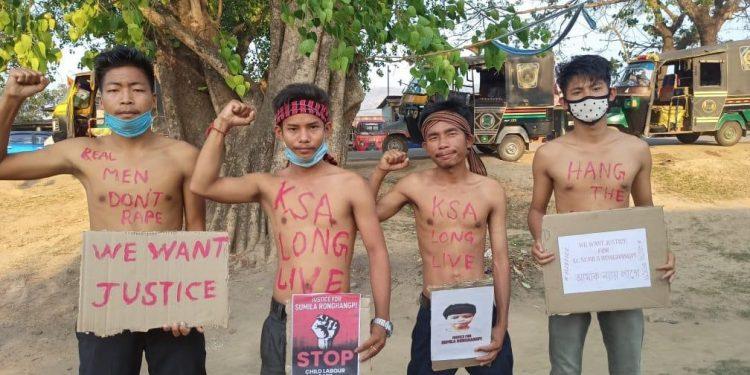The Rape and Murder Of A Karbi Girl In Assam Sheds Light On The Broken Justice System

Protest by Karbi Students Association. Picture Credits: Ajay Rongchehon
Reporting on the alleged rape and murder last month of a 12-year old girl from the Karbi tribe employed as a domestic worker in the Nagaon district of Assam, NIMISHA AGARWAL writes about how the incident is a result of the intersection of a broken justice system and the marginalisation of indigenous tribes in the area.
—–
On 22nd April, the burnt body of a 12-year-old Karbi girl was discovered outside her employer’s home in the Raha town of Nagaon district, Assam. The girl had been working at the house of the affluent, upper-caste Borthakurs for five years. While the Borthakurs alleged that the girl died by suicide, their neighbors and activists rallying for justice for the victim tell a different story.
“If the girl had been burning, would she not make noise, or scream?” says Abhijit Kro, the former president of the Nagaon Karbi Students Association. He adds, “The scene of the crime was also very neat. There was only kerosene at the spot where the victim’s body was found. How can that be possible?”, he adds.
Karbis have been protesting for many days now for a proper and fair investigation. This is because the police have yet to release the post-mortem report. “I cannot tell you what the report exactly says, but it has clear evidence that sexual assault did not take place. For example, it says that ‘the uterus is small’. We are still investigating the case though, and a full report will be out in 15 days,” says Laxman Kumar Das, the officer-in-charge of the Raha police station.
“But if the evidence says that there was no sexual assault, why are they not releasing the report?”, asks Sabin Rongpipi, a Karbi youth activist. “Such cases have happened in the past, and there is never a good lawyer to take the case and no resources to fight back legally. All that we can do is protest,” she adds.
The protestors’ apprehensions were, unfortunately, vindicated, as the Assam State Commission for Protection of Child Rights (ASCPCR) has stepped in, verifying that the victim was found to be pregnant, and demanding a fast track probe in the case. The Nagaon police have since made two arrests in connection with the murder.
The pandemic has also affected the way such cases are being heard in Assam. In an already slow-moving process, hearings have been further delayed, and the police are not functioning properly. Moreover, the Karbi families whose kids are in Nagaon are not able to meet their kids.
Steady supply of Karbi children to provide cheap labour in Nagaon
Every year, Karbi families are lured by affluent families in Nagaon to send their children to them on the promise of a good house and good education, something that the Karbis cannot afford to give to their children. Some of the children are also kidnapped, and never seen again.
“We get 60-70 Karbi children back home every year. But there is no infrastructural support for them when they come back — no schools, no electricity, and no justice for the trauma that they faced,” says Thangsing Timung, the president of Karbi Students’ Association.
The district has a child protection unit, but it does not give much attention to the issue of Karbis or the areas populated by them, “because it is a backward area,” according to Kro. “We have often taken cases to the police, but they seldom file an FIR, and just register a simple complaint. Many times, even parents hesitate to file an FIR due to fear and alienation,” he adds.
According to estimates by the Karbi Human Rights Watch, about 5,000 of their children are in Nagaon as domestic workers. However, the District Child Welfare Officer (DCPO), Anjali Arya disagreed with the estimate. “Whenever we get alerted of a child working in Nagaon, we send our rescue team and put them in rehabilitation homes. Between 2019 and 2021, we have rescued about 30 children,” she says.
However, many of these children are brought through the district border in buses and private vehicles. So checkpoints at these vulnerable spots are essential. However, the DCPO has denied that children are brought on such a big scale, despite various Karbi organizations notifying police otherwise. “We do check vehicles. Your information is wrong — children are not brought on such a big scale. We are in the process of doing our own investigation into how many Karbi children are actually employed in Nagaon,” she added.
It is worth noting that while the DCPO confidently denied the estimate of the number of children given by the Karbi community, they have only recently started mapping the actual figure. It is wondered on what basis they have challenged the figure, then.
The DCPO also said that since this is the “first time” that such an incident (the murder) has happened, a full-fledged investigation has been launched. However, Dharam Sing Teron, a former Member of the Assam Legislative Assembly and a well-known activist, does not agree. “A few years back, the murdered body of a Karbi child was found on the railway tracks. The case was taken to the police and local authorities, but nothing was done. No justice was delivered,” he says.
Latest in long line of Karbi children’s lives lost
Indeed, this is not the first time that a Karbi child has been murdered. A Karbi boy was found dead in a school in Nagaon in 2018. And Kro has been reported to have carried dead bodies of Karbi children back to their village every year. So why is no action taken on these cases?
Teron blames the social dynamics of the justice system. “The system has placed the dominant society in power. You will hardly see Karbis who are a part of the legal justice system. We have less representation,” he says.
Rongpipi also highlights the intersection of class and social hierarchy when it comes to getting justice for Karbi children. “The justice system here is very weak. You need money for courts. People are also not legally conscious, and will rather go to the village head than police and courts to solve their problems,” she says. She also highlights how because of this intersection, there is no pressure on the system, and the people who exploit their children are hence “not afraid of us.”
There is also a language barrier that Karbis face when they approach the police. They do not know Assamese or English, and they need to learn new languages just to talk to people.
Rongpipi’s mother, Kajek Tokbipi is a women’s activist for more than 30 years now. She highlights the inactiveness of the Child Welfare Committee (CWC) in taking up cases of Karbi children. “The CWC in Assam does not need to wait for anyone to lodge a case. They can take suo motu action. They are also responsible to compensate the victims. However, they hardly do anything,” she says.
The Superintendent of Police (SP) (Nagaon), Gaurav Abhijit said that he is constantly in touch with the victim’s family and that his priority is that the family gets justice. But the victim’s uncle, Babu Ronghang denies that the SP is in touch. “The SP has not called us once,” he says. “No one from Nagaon has called us. Only a Karbi person from the Nagaon police station has been calling us to keep us informed about the developments. We do not even know what is written in the post-mortem report,” he adds. This is in stark contrast to the SP’s statement claiming that he has disclosed the results of the post-mortem report to the family.
The ASPCR’s interest in the matter offers some hope. All of the victim’s siblings who were employed in Nagaon have now been returned. However, Timung says that more is needed. “We need schools. We need representation. We need justice for thousands of our children, and our community,” he says.
(Nimisha Agarwal is a former trek leader turned freelance journalist, reporting primarily on animal agriculture, gender, and the environment from India. They shed light on underreported stories of India that have the potential to connect ideas and communities. With an MA in Gender Studies, the role of social locations and privilege feature heavily in their reporting. The views expressed are personal.)
The article was originally published in The Leaflet.
Get the latest reports & analysis with people's perspective on Protests, movements & deep analytical videos, discussions of the current affairs in your Telegram app. Subscribe to NewsClick's Telegram channel & get Real-Time updates on stories, as they get published on our website.
























